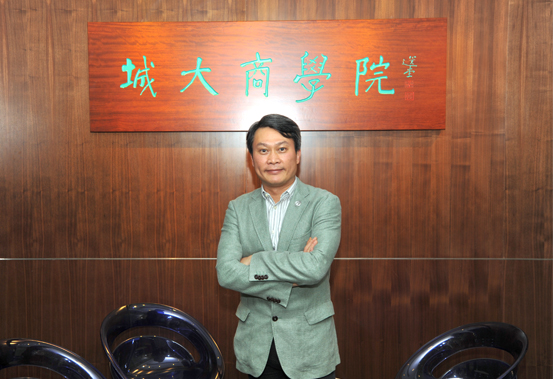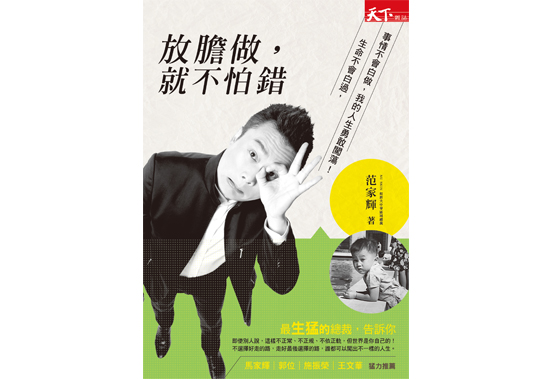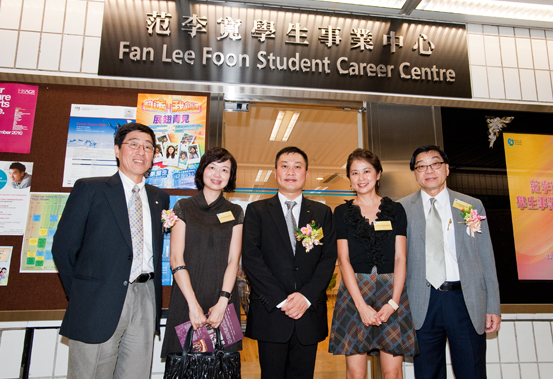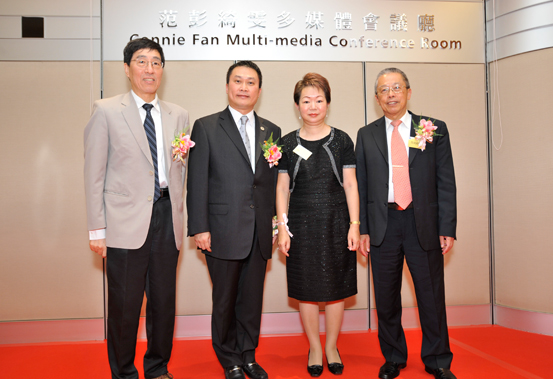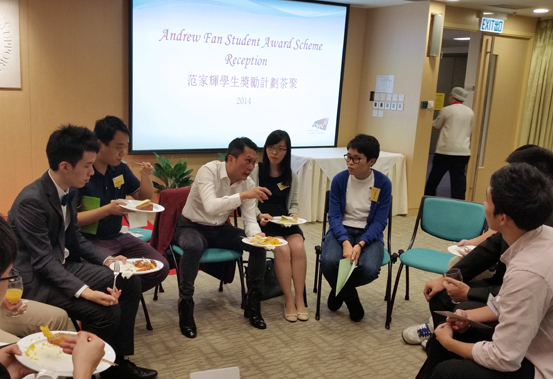Mr Andrew Fan Ka-fai graduated from CityU's first cohort of the Bachelor of Arts in Business Studies programme in 1988. He is Regional President of Greater China for Nu Skin Enterprises Inc. and a member of the Council of CityU. Here he talks about his early days at CityU, what it takes to build a university culture of innovation, and the university Unique Selling Point.
Mr Andrew Fan Ka-fai
Andrew Fan's book, Dare to Fail, published in 2014
© Book Publishing, CommonWealth Magazine Group
Genesis
You were part of CityU back at the beginning. What was the University like then?
I was in the first cohort at CityU. It was like a company, like a business. We were in Mong Kok, and in a commercial building. There were less than a thousand students. I remember the lift system. In my first year we were free to go to any floor. In the second year, odd or even floors. The third year one lift would go to just three floors. Then we had to use the back stairs to move up or down a floor or two. It was very congested. That's where we met people.
What was the educational atmosphere like?
I'm not sure how much most of the students knew about the university before they joined. After all this was a new institution at that time. However, I think freedom was what everybody was looking forward to. In the old days the secondary schools were quite disciplined. It was a bit like a boarding school atmosphere – except we went home at night. We had prefects who would check if our hair went beyond the collar, or for the ladies how many inches the skirt was above the knee! In Hong Kong most schools were operated by the church. The Catholic stream was much tighter than the other Christian schools. Actually I started to grow longer hair when I got away from the Catholics. University was something different. The pun on the name for "University" in Cantonese is " 任你玩四年" meaning "You can have fun of any sort for four years!" That sums it up.
Does it capture the spirit of this University?
We were the ones who shaped the spirit of this University, along with the faculty and management, and because of that we have real passion for this university.
How has the University changed?
Then it was like a small family and now it has become so big. The canteen could only take 40 or 50 people. Now it can take a thousand. The Students' Union was tiny. In the Student Affairs Office we knew everyone by name.
Leadership
You were Chairman of the Council of the Students' Union. Is it important to encourage leadership?
I didn't think of myself as a leader. I participated in these extra curricula activities to have fun. I am kind of an extrovert person, being expressive and proactively participating, and then I found that the more that you do, the more likely it was that you were going to become a leader. But I really didn't position myself as such. Things would just naturally evolve. A leader is not a position like a manager. It is about whether you can become influential, how you can speak with and for people. It helped me live a more meaningful life. In the business sector by the way it is no good becoming a leader. You have no life. Everyone knows what you do! Sometimes you think it is a choice, but when things evolve you really don't have that much choice.
You work in multiple markets in the region. Do you see significant differences?
Mainland China is like the European Union, it is so big. Some provinces are as big as a European country, they are all different in terms of the economy. Local cultures like the Shanghainese go by rule book, but people in Guangdong who have been closer to Hong Kong for years are more flexible. They will see what the rule doesn't cover. The mentality is different.
Innovation
How about innovation on the mainland compared to Hong Kong?
It's not a fair comparison because you are talking about 1.4 billion compared to 7 million; that makes a massive difference.
So is innovation happening in Hong Kong?
Have you heard about DJI, the Chinese company that produces the civilian drone? It was innovated by graduates from the Hong Kong University of Science and Technology. They tried to build a business in Hong Kong but no one would fund it. So they took the whole innovation to Shenzhen along with a couple of professors, and now they
are worth 50% of the global market.
But we have so many government initiatives funding innovation.
The government does not need to fund anything. The government just needs to produce policy to encourage, and to build the infrastructure to facilitate. How many incubator projects do we have at Hong Kong universities? In China they have tons. Actually I am trying to work out one for CityU. I am working with David Ai, who is Director of the Knowledge Transfer Office. We need to build an innovative culture here.
How do we do it?
Recognise achievement. Show success cases. And tell people success comes from failure.
That's a big one…
People need to know. You can get a lot of good returns after you are willing to take risks and take failure on board.
A lot of people still look to the United States for inspiration…
Sure, nobody is going to criticise you for dropping out of school there. But here people still need to graduate. They must all have these PhDs. Asia is a place of natural conformists. Even when you apply for government money, say for innovation funds, you still have to conform to their rules for getting the money. It all becomes another bureaucratic procedure.
So how do we encourage innovation for real in a university?
Recognising how people are moving to create something that is useful to life – and recognising progress other than the final product. Angel funds, capital investors are all looking for projects. Business opportunities and money will come in. But at the early stage it may just be a dream.
The Fan Lee Foon Student Career Centre, named after Andrew Fan's late grandmother in 2010
Incubator project
How did you get involved in the incubator project?
I am the Chairman of the CRC, the Community Relations Committee at the University Council. Part of the job is asking how we can build the brand of the University, and part of that is asking how we can identify technology coming out of this University that can be transferred into commercial products useful to society. In that way we can make a name out there. And my thinking is that we have a lot of great scholars, with great ideas, but these great ideas are going begging. That is, they are not being commercialised.
People believe that innovation drives the economy…
Let's go back to what we mean by innovation. It's finding a different way of making better things.
You must be innovating in your own company?
Correct, innovation is very important. New products that people would like to have. And going back to leadership, you can think something different from the others. Or you can think of something earlier than the others. People talk about vision. What do we mean by that? It's not that you are thinking necessarily different to the others, you think about it earlier.
The Multi-Media Conference Room was renamed the Connie Fan Multi-media Conference Room in honour of Andrew Fan's mother in 2011
Andrew Fan talking at the Student Awards Scheme gathering in 2014
The University USP
Is there a way of shortening the "product development time", the time that it takes for new ideas to get into the curriculum?
To me it doesn't really matter what subject you teach at the university. What really matters is how the teacher gets the students to evolve a form of thinking. The subject is secondary. What counts is how you can condense the learning in your life into a model that is simple and has explanatory power, or that will inspire. The core of education is helping people come up with a way of thinking. That is the university's abiding USP. These days teaching means big classes – so you can serve the greatest number in the community. In the old days you would look for a mentor and you would follow him for life, like Confucius, he didn't really start a formalised institution.
Still you say university lags behind the cutting edge.
It's a bit more complex than that. Undergraduate education inevitably lags, but with postgraduate education you drill into your own interests. And that's where most innovation happens in the university. There is more of a chance that it is closer to cutting edge. And that is helped by professors who are part of the revolving door, practising in industry part time, or business people in education. For instance, I lecture part time at Nanjing University. So that helps transfer – there are more knowledge flows between the business sector and the university sector than ever before. I think the world is getting closer and closer. It's a global village. To stay competitive, you have to stay connected.
Are we doing enough to encourage our students to give to society?
People often talk about "giving back" to society. I would say it's more about simply giving. The question is can we inspire our students to give? We are not encouraging them to think about what they can get out of the situation. People give if they have the ability. Everyone may have a different measurement as to what "enough" means. Giving is never going to be enough, but the more we give spiritually, the closer we get to an enriched life. If I can die and see the smiling faces of the ones I have helped, I think I can pass away nicely.
